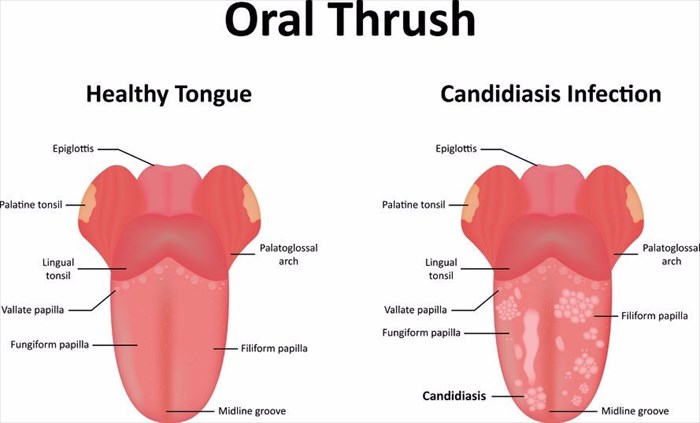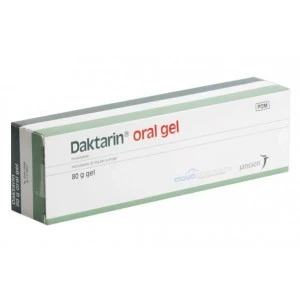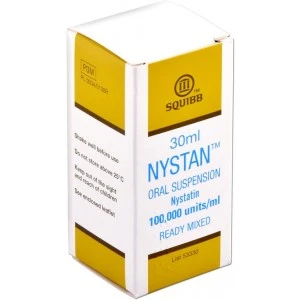Oral Thrush
Oral thrush can be a bothersome condition that affects the mouth and throat. It is important to seek proper diagnosis and treatment for oral thrush to alleviate discomfort and prevent complications.
In this guide, we will explore the causes, symptoms, prevention methods, and treatment options for oral thrush.
Daktarin Oral Gel
- Soothes and clears fungal infections
- 100% sugar-free
- Buy online today
Nystan (Nystatin)
- Easy administration
- Treats oral thrush quickly
- Available from a UK pharmacy
What is Oral Thrush?
Oral thrush is a common yeast infection caused by a fungus called Candida. This infection can occur in the mouth and throat, leading to various uncomfortable symptoms. People who wear dentures or use corticosteroid inhalers are at an increased risk of developing oral thrush.
Symptoms of Oral Thrush:
- Burning sensation in the mouth
- Cracks in the corners of the mouth
- Loss of taste
- Oral pain
- Redness inside the mouth and throat
- Unpleasant taste
- White patches in the mouth that may cause mild bleeding when wiped off
If left untreated, the fungal infection can spread to other areas of the body, such as the brain, liver, and heart, by entering the bloodstream.
Diagnosing Oral Thrush:
Oral thrush can be diagnosed based on clinical signs, such as the presence of white blotches in the mouth. In some cases, a sample of the lesion may be taken and examined under a microscope. Your doctor may also perform a blood test to identify any underlying medical conditions that may make you more susceptible to oral thrush.
If you are experiencing symptoms of oral thrush, particularly if they affect your ability to eat or drink, it is crucial to consult your doctor for a proper diagnosis and to determine the most appropriate treatment.
Causes and Risk Factors of Oral Thrush:
Oral thrush occurs when the natural fungus Candida multiplies excessively. Several factors can increase your risk of developing oral thrush, including:
- Diabetes
- Dry mouth caused by a medical condition or treatment
- HIV
- Iron deficiency
- Poor oral hygiene
- Smoking
- Taking antibiotics
- Underactive thyroid
- Undergoing radiotherapy or chemotherapy for cancer treatment
- Using inhaled corticosteroids (preventer asthma inhalers)
- Vitamin B12 deficiency
- Wearing ill-fitting dentures
While Candida can be passed between adults through activities like kissing, it is unlikely to cause an infection unless the individual is already at risk of developing the condition. Therefore, it is advisable to avoid kissing or engaging in oral sex until the infection has completely cleared.
Oral thrush can also be transmitted from mother to infant during breastfeeding. In such cases, both the mother and child should be treated accordingly.
Preventing Oral Thrush:
Practising good hygiene is key to preventing oral thrush. Follow these preventive measures:
- Brush your teeth and floss daily, especially if you are at an increased risk of developing the condition.
- Rinse your mouth after using a corticosteroid inhaler to clear the medicine and prevent the accumulation of fungi that can cause thrush.
- Reduce your consumption of yeast-containing food and beverages, such as beer, bread, and wine, to help prevent the development of oral thrush.
If you experience recurring episodes of oral thrush, it is important to consult your doctor. They may recommend tests to identify any underlying conditions that may contribute to your increased risk of developing oral thrush.
Treatment Options for Oral Thrush:
Several antifungal medications are available for treating oral thrush. These medications work by targeting and eliminating the Candida fungus cells responsible for the infection. Commonly prescribed antifungal treatments include:
It is essential to consult your online prescriber or pharmacist to determine the most suitable treatment option for your specific condition. They can provide guidance and information about potential side effects or interactions with other medications.
Faqs
How to treat oral thrush?
To treat oral thrush, antifungal medications are commonly used. These medications can be prescribed in various forms, including oral rinses, lozenges, or oral gels, depending on the severity of the infection. It is important to follow the prescribed treatment regimen and complete the full course of medication as directed by your healthcare professional.
How to get rid of oral thrush?
To eliminate oral thrush, it is essential to address the underlying fungal infection. Following the prescribed treatment plan, maintaining good oral hygiene practices, such as regular brushing and flossing, and avoiding factors that can contribute to the overgrowth of Candida fungus, such as excessive sugar consumption, can help eliminate oral thrush.
How do you get oral thrush?
Oral thrush is caused by an overgrowth of the Candida fungus, which is naturally present in the mouth. It can occur when the balance of microorganisms in the mouth is disrupted, allowing the Candida fungus to multiply. Factors such as weakened immune systems, certain medications (such as antibiotics or corticosteroids), poor oral hygiene, and underlying medical conditions can increase the risk of developing oral thrush.
What causes oral thrush?
Oral thrush is primarily caused by the overgrowth of the Candida fungus in the mouth. Various factors can contribute to this overgrowth, including weakened immune systems, certain medications, poor oral hygiene, underlying medical conditions (such as diabetes or HIV), dry mouth, smoking, and wearing ill-fitting dentures.
What is oral thrush?
Oral thrush, also known as oral candidosis, is a common yeast infection caused by the Candida fungus. It affects the mouth and throat, leading to symptoms such as white patches, redness, soreness, a burning sensation, and loss of taste.
What causes oral thrush in adults?
Oral thrush in adults can be caused by various factors, including a weakened immune system, certain medications (such as antibiotics or corticosteroids), poor oral hygiene, underlying medical conditions (like diabetes or HIV), dry mouth, smoking, and wearing ill-fitting dentures. These factors can disrupt the natural balance of microorganisms in the mouth, allowing the Candida fungus to overgrow.
How long does oral thrush last without treatment?
If left untreated, oral thrush may persist or worsen over time. The duration can vary depending on individual factors; however, oral thrush typically does not resolve on its own without appropriate treatment.
What does oral thrush look like?
Oral thrush typically appears as white, creamy patches or plaques on the tongue, inner cheeks, roof of the mouth, gums, or tonsils. These patches may have a cottage cheese-like appearance and can be easily wiped off, which can sometimes cause mild bleeding.
What does oral thrush look like in adults (with pictures)?
Oral thrush in adults appears as white or cream-coloured patches.

Authored & Reviewed By

Dr Giuseppe Aragona
DoctorPublished on: 03/04/2019 Reviewed on: 28/04/2023
© 2013 - 2026 Al Muhsineen Limited. All Rights Reserved. Registered Pharmacy: 34 Halliwell Road, Bolton BL1 8RL. Registered Office: 254 First Floor, Shearbrow, Blackburn, England, BB1 8DS








